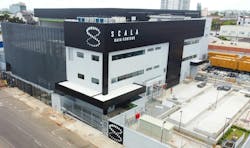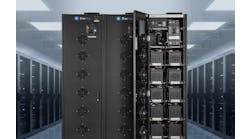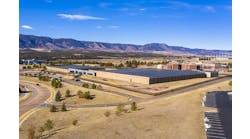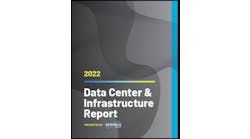Brazil's Scala Data Centers Secures LATAM Dominance, Plans To Develop 'AI City'
In September 2024, Porto Alegre in Brazil began to make epic leaps in its digital infrastructure with the announcement of Scala AI City, a collaboration between Scala Data Centers and the government of Rio Grande do Sul that will lead to Brazil’s and indeed South America’s largest and most advanced data center complex, with an initial investment of $500 million.
Scala AI City will be located in Eldorado do Sul and will help make Brazil a central hub of the AI revolution.
A Vision of Innovation
Scala AI City now becomes the largest data center project in Latin America and one of the biggest bets on the future of artificial intelligence, machine learning and cloud computing technologies in Latin America.
Initially, the investment is anticipated to be $ 500 million, but it’s expected that this figure will be increased exponentially, considering that the total investment at the end of the project may reach $90 billion.
One of the strongest proponents of this project has been Rio Grande do Sul’s governor Eduardo Leite, who stressed the urgency for swift and decisive action, saying:
"We are looking at an initial investment of USD 500 million with the potential to reach USD 90 billion when fully realized. We must be ambitious and bold with this project, not just dreaming, but actively working to make it a reality. Our commitment is to work diligently at the national level to create a favorable regulatory environment for data centers and issues related to artificial intelligence.
This moment is like a wave that gives us a chance to ride, but it is fleeting. If we do not build this favorable environment immediately, we risk seeing the energy transition happen in other countries, leaving us behind. Acting now is crucial to ensure that Brazil doesn’t fall behind in this important global transformation.”
This first data center industrial district is among the fundamental pillars of the plan to turn Rio Grande do Sul state into a regional hub and a pivotal node in the AI-driven global economy.
Strategic Location and Expansion Potential
The location of Scala AI City in Eldorado do Sul was chosen for its geostrategic position, as it is the most protected city in Brazil from natural disasters, supported by a stable energy supply, and includes abundant space to be expanded upon in the upcoming years.
Another reason for its success is its position in the immediate proximity of the cities of São Paulo, Rio de Janeiro and Buenos Aires, with planned connection to the Malbec submarine cable, which will provide quantic global low-latency connectivity, along with the great connections to all main global hubs.
This will become an opportunity to expand Brazil’s influence in the global AI and data ecosystems.
Scala AI City’s footprint is designed to support up to 1,730 acres. But it is hoped to be the beginning of a scalable infrastructure that could support 100 times that initial footprint.
According to Scala’s estimates, neither Argentina nor Uruguay currently have installed capacities close to what Scala AI City is planned to reach. The campus is expected to host the most demanding AI and machine-learning workloads.
The initial plan, with 54 MW of capacity – seven times higher than the existing Porto Alegre region's capacity infrastructure – is aimed at meeting the growing demand for these services.
Flagship Tamboré Campus Expansion and Green Financing
Scala already operates the largest data center in the region, its 42 MW Tamboré Campus, for which the operator recently announced its expansion to a 200 MW campus.
Anchor clients at Scala's Tamboré Campu have already been secured for three new data centers (SGRUTB09, SGRUTB10, and SGRUTB67) for which the target date for commissioning is in the second half of 2025.
The completion of this stage of construction, which will have six operational data centers and four more under construction, is just the next step to the final stage, which will result in a completed campus with 3 substations, 17 buildings, and 600 MW of capacity.
Significantly, Marcos Peigo, CEO and co-founder of Scala, was quoted as saying:
"The demand for data centers is growing seven to ten times with the rise of artificial intelligence, positioning us not only to serve the local market but also to export data center solutions, helping to solve global challenges, especially in North America."
Shortly after the company's announcement of its Tamboré Campus expansion, Scala announced that they had issued $250 million in green debentures to finance the completion of their SGRUTB09 data center, which is already in an advanced stage of construction.
This 36 MW data center is dedicated to a single hyperscaler client, focused on cloud and AI operations, and will go into service in the second half of 2025.
The green financing operation was carried out in Brazilian Reais (BRL) with a US Dollar (USD) swap to protect the company against exchange rate fluctuations.
Notes on Future Expansion
Because the new data centers in the Scala AI City will be interconnected with the company’s existing POAPA01 data center in Porto Alegre, it will be able to take advantage of the site's low-latency connectivity infrastructure, and will be in position to integrate with the major global hubs with existing connectivities.
There is also a planned connection to the 2500 km Malbec submarine cable, which links São Paulo and Rio de Janeiro to Buenos Aires. Future development is expected to pass through the capital of Rio Grande do Sul. Taking advantage of these resources will help Scala in ensuring the long-term sustainability and growth of the AI data center city.
Driving Economic Development
Apart from technological development, the Scala AI City is expected to drive economic development in Rio Grande do Sul and across Brazil.
The first phase of the project alone will create more than 3,000 direct and indirect jobs, in addition to thousands of indirect jobs in the sectors of construction, energy and telecommunications companies throughout the region.
Local labor and supply will become an important part of the project’s ongoing operations, further stimulating the socioeconomic development of the surrounding communities, hopefully echoing the types of co-development seen in major North American data center projects.
Cutting-Edge Infrastructure and Future-Proof Design
The Scala AI City’s infrastructure is being designed from scratch to support the requirements of HPC and AI/ML workloads. The project will support rack power requirements of more than 150 kW, recognizing the increased demand of these workloads, and will provide appropriately scaled liquid cooling.
The importance of Scala's focus on sustainability should also be noted.
Agostinho Villela, Chief Technology Officer of Scala Data Centers, talked about the ways his company was addressing the sustainability challenge at this month's inaugural Data Center Frontier Trends Summit conference from Sept. 4-6, holding down one-third of a panel session entitled “Data Centers' Ultimate Sustainability Challenge: Balancing Growth for the AI Energy Infrastructure Trilemma."
Scala has ambitious plans for meeting the sustainability concerns of the industry in their data centers, while addressing the demands of AI-driven computing services.
To increase energy efficiency, enhanced high-end cooling technologies such as liquid cooling will be implemented in Scala AI City, looking to offer more efficient solutions than traditional air cooling.
Also significantly, having signed a memorandum of understanding with Serena, a global clean energy leader, Scala is committed to using all-renewable energy, much of which will be provided by wind generators located in farming areas in Bahia.
This agreement, which will commence in January 2025, represents the largest renewable power commitment in Latin America and makes Scala the first data center provider in the region to make a 100% renewable power commitment.
Brazil is widely known as a global leader in renewable energy, with a large share of its electricity generation coming from renewable sources and a commitment to expanding its use. In 2023, Brazil generated 91% of its electricity from clean sources, with hydro accounting for 60% and wind and solar accounting for 21%.
With the current planned design of the Scala AI City, the Power Usage Effectiveness (PUE) ratio is expected to be less than 1.2, which would be the lowest in Latin America -- and as the campus cooling system plans are to consume no water, its Water Usage Effectiveness (WUE) would be zero.
Strategic Partnerships and Global Ambitions
The AI City project will be developed leveraging key partnership stakeholders, including those supporting the regulation, certification, compliance, and operation at the highest international standards for data centers.
Scala Data Centers, a DigitalBridge company, has a history of developing sustainable data center infrastructure in Latin America, and already operates facilities in Brazil, Chile and Colombia.
Spearheaded by a leadership team of more than 1,100 professionals dedicated to high-availability data center infrastructure, the company enables its customers, which consist of leading cloud providers, AI/ML workloads and large enterprises, to deliver mission-critical services and applications with the highest level of energy efficiency.
The announcement with Serena further solidified Scala’s commitment to sustainability with the largest renewable energy supply contract in Latin America, securing Scala a long-term supply of wind power from its Bahia sites, Assuruá 4 and Ventos da Bahia 3, while adding an installed capacity of 393 MW, to scale up toward operating Scala AI City as efficiently as possible, given today’s AI and HPC workload energy demands.
As Scala Data Centers' CEO and Co-Founder Peigo, who is also a Senior Advisor to DigitalBridge, stated during the announcement of the Scala AI City:
"Today, we take a monumental step toward the digital future of Latin America with the creation of Scala AI City. This project, born from a visionary partnership with the Rio Grande do Sul government, represents an initial investment of USD 500 million and the construction of what could be the largest and most innovative digital infrastructure project on the continent.
We are not only elevating Brazil to a new technological level but also driving the state's economic and social recovery, generating thousands of jobs, and promoting the sustainable development of various industries. Scala AI City will be a milestone of innovation, positioning Rio Grande do Sul and Brazil as global leaders in the AI revolution.
This is a historic moment that redefines the future of technology and the economy in the region, with the potential to change the future of our country.”

David Chernicoff

Matt Vincent
A B2B technology journalist and editor with more than two decades of experience, Matt Vincent is Editor in Chief of Data Center Frontier.







